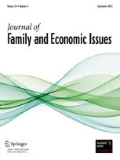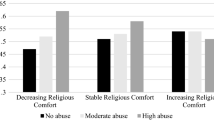Abstract
Using a sample of 222 young adults attending college, the present study examined the relative contribution of young adults’ perceived economic pressures, financial coping and religious meaning-making coping strategies in accounting for variation in their reports of psychological well-being within the context of the United States economic crisis. Results suggest a direct relationship between perceived economic pressure and psychological well-being such that young adults who reported having to make more economic adjustments as a result of economic crisis also reported higher levels of depressed mood and anxiety. Young men and women who reported having to make fewer economic adjustments and being able to meet their material needs reported higher levels of life satisfaction. Regardless of young adults’ self-reported level of economic pressures, the use of education and communication financial coping strategies was related to lower levels of self-reported anxiety and depressed mood and greater life satisfaction. Viewing the financial crisis as a punishment from God was generally associated with young adults’ reports of greater depressed mood and less life satisfaction. Implication of findings for research and practice are discussed.
Similar content being viewed by others
References
Ano, G. G., & Vasconcelles, E. B. (2005). Religious coping and psychological adjustment to stress: A meta-analysis. Journal of Clinical Psychology, 61, 461–480. doi:10.1002/jclp.20049.
Berg-Cross, L., & Green, R. (2010). The impact of the recession on college students. Journal of College Student Psychotherapy, 24, 2–16. doi:10.1080/87568220903400047.
Bergin, A. E., & Jensen, J. P. (1990). Religiosity of psychotherapists: A national survey. Psychotherapy, 27, 3–7. doi:10.1037/0033-3204.27.1.3.
Braunstein, S., & Welch, C. (2002). Financial literacy: An overview of practice, research, and policy. Federal Reserve Bulletin, 445–457.
Conger, R. D., Conger, K. J., Elder, G. H., Lorenz, F. O., Simons, R. L., & Whitbeck, L. B. (1992). A family process model of economic hardship and adjustment of early adolescent boys. Child Development, 63, 526–541. doi:10.2307/1131344.
Conger, R. D., Conger, K. J., Matthews, L. S., & Elder, G. H. (1999). Pathways of economic influence on adolescent adjustment. American Journal of Community Psychology, 27, 519–541. doi:10.1023/A:1022133228206.
Conger, R. D., Elder, G. H., Lorenz, F. O., Conger, K. J., Simons, R. L., Whitbeck, L. B., et al. (1990). Linking economic hardship to marital quality and instability. Journal of Marriage and Family, 52, 643–656. doi:10.2307/352931.
Conger, R. D., Elder, G. H., Lorenz, F. O., Simons, R. L., & Whitbeck, L. B. (1994). Families in troubled times: Adapting to change in rural America. Hawthorne, NY: Aldine de Gruyter.
Diener, E., Emmons, R. A., Larsen, R. J., & Griffin, S. (1985). The satisfaction with life scale. Journal of Personality Assessment, 49, 71–75. doi:10.1207/s15327752jpa4901_13.
Folkman, S., & Lazarus, R. S. (1985). If it changes it must be a process: Study of emotion and coping during three stages of a college examination. Journal of Personality and Social Psychology, 48, 150–170. doi:10.1037//0022-3514.48.1.150.
Folkman, S., & Moskowitz, J. T. (2004). Coping: Pitfalls and promise. Annual Review of Psychology, 55, 745–774. doi:10.1146/annurev.psych.55.090902.141456.
Folkman, S., & Moskowitz, J. T. (2007). Positive affect and meaning-focused coping during significant psychological distress. In M. Hewstone, H. Shut, J. de Wit, K. Van Den Bos, & M. Stroebe (Eds.), The scope of social psychology: Theory and applications (pp. 193–208). Hove, UK: Psychology Press. Psychology, 55, 745–774. doi:10.1146/annurev.psych.55.090902.141456.
Guo, Y., Wang, S., Johnson, V., & Diaz, M. (2011). College students stress under current economic downturn. College Student Journal, 45, 536–543.
Gutter, M., & Copur, Z. (2011). Financial behaviors and financial well-being in college students: Evidence from a national survey. Journal of Family and Economic Issues, 32, 699–714. doi:10.1007/s10834-011-92-2.
Hayhoe, C. R., Leach, L. J., Turner, P. R., Bruin, M. J., & Lawrence, F. C. (2000). Differences in spending habits and credit use of college students. Journal of Consumer Affairs, 34, 113–133. doi:10.1111/j.1745-6606.2000.tb00087.x.
Institute for College Access and Success. (2010). College student debt comparisons by state. Retrieved from http://college-insight.org/#explore/go&h=f775ddf0be9f379bff261307aad062de. Accessed March 4, 2012
International Monetary Fund. (2009). United States: Selected issues. IMF Country Report No. 09/229. Washington, DC.
Joo, H., & Grable, J. E. (2004). An exploratory framework of the determinants of financial satisfaction. Journal of Family and Economic Issues, 25, 25–50. doi:10.1023/B:JEEI.0000016722.37994.9f.
Kahn, L. B. (2010). The long-term labor market consequences of graduating from college in a bad economy. Labour Economics, 17, 303–316. doi:10.1016/j.labeco.2009.09.002.
Keyes, C. L. M., Shmotkin, D., & Ryff, C. D. (2002). Optimizing well-being: The empirical encounter of two traditions. Journal of Personality and Social Psychology, 82, 1007–1022. doi:10.1037/00223514.82.06.1007.
Kim, J., Garman, E. T., & Sorhaindo, B. (2003). Relationships among credit counseling clients’ financial well-being, financial behaviors, financial stressor events, and health. Financial Counseling and Planning, 14, 75–87.
Leach, L. J., Hayhoe, C. R., & Turner, P. R. (1999). Factors affecting perceived economic well-being of college students: A gender perspective. Financial Counseling and Planning, 10, 11–24.
Maurer, T. W., & Lee, S. (2011). Financial education with college students: Comparing peer-led and traditional classroom instruction. Journal of Family and Economic Issues, 32, 680–689. doi:10.1007/s10834-011-9266-z.
Pargament, K. I., Ensing, D. S., Falgout, K., Olsen, H., Reilly, B., Van Haitsma, K., et al. (1990). God help me: (1): Religious coping efforts as predictors of the outcomes to significant negative life events. American Journal of Community Psychology, 18, 793–824. doi:10.1007/BF00938065.
Pargament, K. I., Koenig, H. G., & Perez, L. M. (2000). The many methods of religious coping: Development and initial validation of the RCOPE. Journal of Clinical Psychology, 56, 519–543. doi:10.1002/(SICI)1097-4679(200004)56:4<519:AID-JCLP6>3.0.CO;2-1.
Park, C. L. (2005). Religion as a meaning-making framework in coping with life stress. Journal of Social Issues, 61, 707–729. doi:10.1111/j.1540-4560.2005.00428.x.
Parke, R. D., Coltrane, S., Duffy, S., Buriel, R., Dennis, J., Powers, J., et al. (2004). Economic stress, parenting, and child adjustment in Mexican American and European American families. Child Development, 75, 1632–1656. doi:10.1111/j.1467-8624.2004.00807.x.
Princeton Religious Research Center. (1996). Religion in America 1996. Princeton, NJ: Princeton Religious Research Center.
Radloff, L. (1977). The CES-D scale: A self-report depression scale for research in the general population. Applied Psychological Measurement, 1, 381–401. doi:10.1177/014662167700100306.
Robb, C. A. (2011). Financial knowledge and credit card behavior of college students. Journal of Family and Economic Issues, 32, 690–698. doi:10.1007/s10834-011-9259-y.
Roberts, R. E., Rhoades, H. M., & Vernon, S. W. (1990). Using the CES-D scale to screen for depression and anxiety: Effects of language and ethnic status. Psychiatric Research, 31, 69–83. doi:10.1016/0165-1781(90)90110-Q.
Serido, J., Shim, S., Mishra, A., & Tang, C. (2010). Financial parenting, financial coping behaviors, and well-being of emerging adults. Family Relations, 59, 453–464. doi:10.1111/j.1741-3729.2010.00615.x.
Shim, S., Xiao, J. J., Barber, B., & Lyons, A. (2009). Pathways to life success: A conceptual model of financial well-being for young adults. Journal of Applied Developmental Psychology, 30, 708–723. doi:10.1016/j.appdev.2009.02.003.
Solantaus, T., Leinonen, J., & Punamäki, R. L. (2004). Children’s mental health in times of economic recession: Replication and extension of the Family Economic Stress Model in Finland. Developmental Psychology, 40, 410–429. doi:10.1037/0012-1649.40.3.412.
Spitzer, R. L., Kroenke, K., Williams, J. B. W., & Lowe, B. (2006). A brief measure for assessing generalized anxiety disorder: The GAD-7. Archives of Internal Medicine, 166, 1092–1097. doi:10.1001/archinte.166.10.1092.
Stein, C. H., Abraham, K. M., Bonar, E. E., Leith, J. E., Kraus, S. W., Hamill, A. C., et al. (2011). Family ties in tough times: How young adults and their parents view the US economic crisis. Journal of Family Psychology, 29, 445–454. doi:10.1037/a0023697.
Stein, C. H., Abraham, K. M., Bonar, E. E., McAuliffe, C. E., Fogo, W. R., Faigin, D. A., et al. (2009). Making meaning from personal loss: Religious, benefit finding and goal-oriented attributions. Journal of Loss & Trauma, 14, 83–100. doi:10.1080/15325020802173819.
United States Bureau of Labor Statistics. (2010). Unemployment rates for states. Retrieved from http://www.bls.gov. Accessed November 18, 2011.
Willis, L. E. (2008). Evidence and ideology in assessing the effectiveness of financial literacy education. Loyola-LA Law School Legal Studies Paper No 2008-6. Accessed 4 March 2012 from http://papers.ssrn.com/sol3/papers.cfm?abstract_id=1098270.
Worthy, S. L., Jonkman, J., & Pike, L. B. (2010). Sensations-seeking, risk-taking, and problematic financial behaviors of college students. Journal of Family and Economic Issues, 31, 161–170. doi:10.1007/s10834-0109183-6.
Xiao, J. J., Tang, C., & Shim, S. (2009). Acting for happiness: Financial behavior and life satisfaction of college students. Social Indicators Research, 92, 53–68. doi:10.1007/s11205-008-9288-6.
Author information
Authors and Affiliations
Corresponding author
Rights and permissions
About this article
Cite this article
Stein, C.H., Hoffmann, E., Bonar, E.E. et al. The United States Economic Crisis: Young Adults’ Reports of Economic Pressures, Financial and Religious Coping and Psychological Well-Being. J Fam Econ Iss 34, 200–210 (2013). https://doi.org/10.1007/s10834-012-9328-x
Published:
Issue Date:
DOI: https://doi.org/10.1007/s10834-012-9328-x




